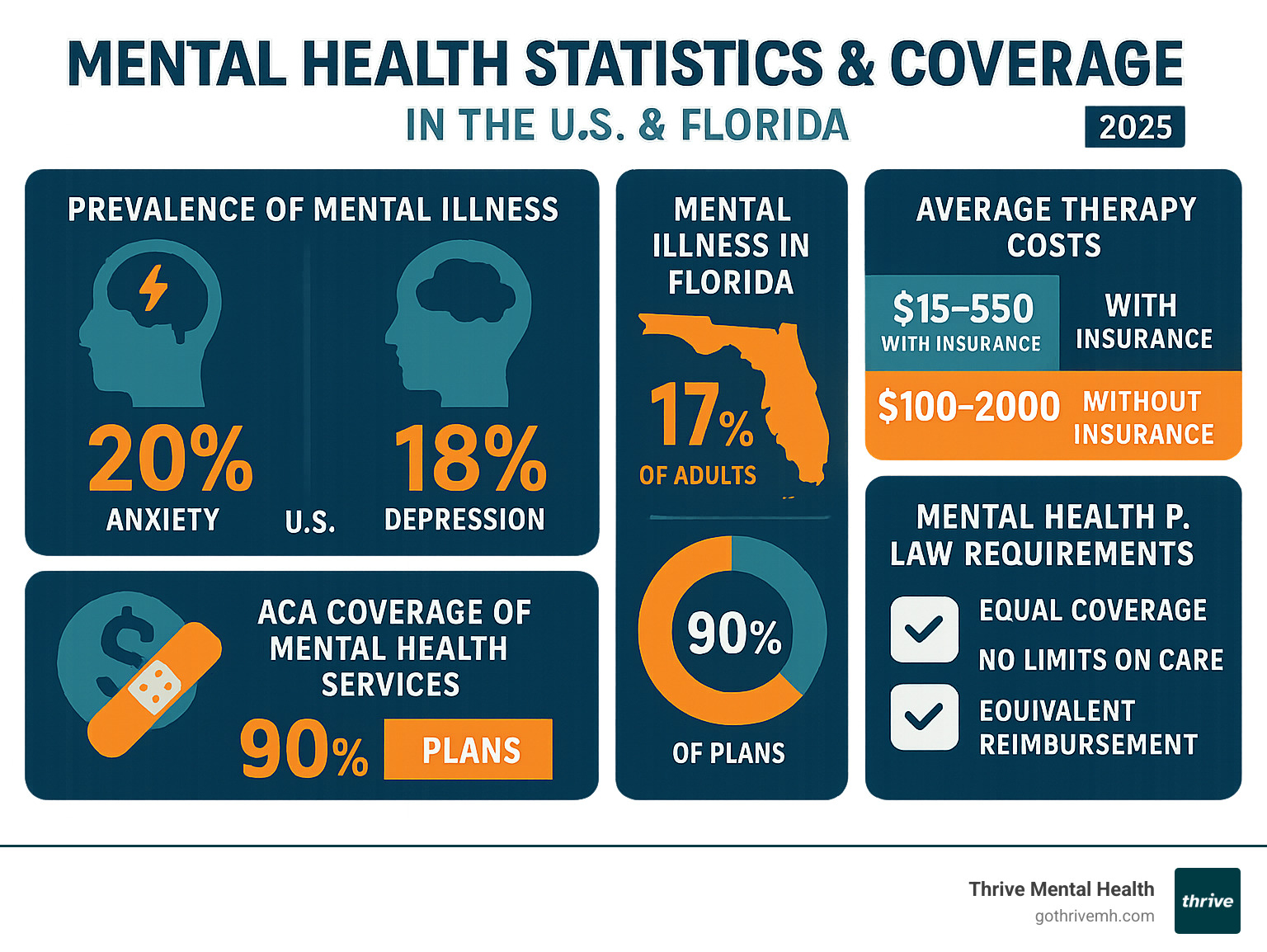Does Your Health Insurance Have Your Back? A Deep Dive into Mental Health Benefits

Why Mental Health Coverage Matters More Than You Think
Health insurance with mental health coverage is more than a basic benefit—it’s a financial safety net for accessing life-changing mental health care when you need it most.
Quick Answer for Health Insurance Mental Health Coverage:
- Federal law requires most health plans to cover mental health services on par with physical health.
- Typical coverage includes: Therapy, psychiatric care, medication, and intensive programs.
- Average costs: $15-50 copays with insurance vs. $100-200+ per session without.
- Key benefits: Access to in-network providers, reduced costs, and parity protections.
The numbers are stark: 1 in 5 U.S. adults experience mental illness annually, and in Florida, that means over 3 million people are affected. In the U.S., over half of young adults cite cost as a primary barrier to care. Many insurance plans cap mental health benefits at just $300-$1,000 per year, which is insufficient for consistent support.
Without proper coverage, basic therapy can exceed $1,500 annually. With good insurance, that cost drops to $300-$600 in copays. The right coverage often determines whether someone gets help.
Over 60% of people with mental health conditions don’t seek care due to cost, stigma, or lack of access. Understanding your benefits turns insurance into a powerful tool for mental wellness.
As CEO of Thrive Mental Health, I’ve spent a decade in healthcare strategy and behavioral health, helping thousands steer health insurance with mental health coverage. My experience shows that informed consumers get better, more affordable care.

Health insurance with mental health coverage basics:
Understanding the Foundation of Mental Health Coverage in the U.S.
Federal laws provide a strong foundation, ensuring health insurance with mental health coverage is a real, accessible benefit.
The Affordable Care Act (ACA) of 2010 made mental health and substance use disorder services one of ten essential health benefits. Most plans, including those on the Health Insurance Marketplace and from small businesses, must now include this coverage.
The Mental Health Parity and Addiction Equity Act (MHPAEA) ensures insurers treat mental health benefits the same as physical health benefits. This means no higher deductibles or stricter limits for mental health care compared to medical care. You can learn more about The Mental Health Parity and Addiction Equity Act (MHPAEA) to understand your rights.
When choosing a plan, you’ll encounter different types of plans. HMO plans are often less expensive but require a referral from your primary care doctor to see a specialist and have a limited network. PPO plans offer more flexibility, letting you see specialists without a referral and go out-of-network, though at a higher cost.
Group insurance (from an employer) often provides more comprehensive coverage at lower costs. Individual Health Insurance plans must also include mental health benefits under the ACA but can vary more in their details.
Don’t overlook public options. Medicaid Covered Therapy provides crucial mental health coverage for millions of Americans, including many Floridians. Medicare also covers mental health care for those 65 and older or with qualifying disabilities.
What Types of Mental Health Treatments Are Typically Covered?
Thanks to federal requirements, most comprehensive plans cover a wide range of treatments.

Psychotherapy, including individual therapy for issues like anxiety and group therapy for peer support, is widely covered.
Psychiatric care covers the medical side, including initial evaluations and ongoing medication management. If you’re on Medicaid, you can find information on accessing a Medicaid Covered Psychiatrist.
For more intensive needs, health insurance with mental health coverage typically includes:
- Inpatient services: 24/7 support in a hospital for severe crises.
- Partial Hospitalization Programs (PHP): Intensive daily treatment while you live at home.
- Intensive Outpatient Programs (IOP): Several hours of therapy per week, offering more support than weekly sessions.
At Thrive Mental Health, we specialize in PHP and IOP programs, combining individual and group therapy with practical skills training.
Telehealth has expanded access to care. Many plans now include Virtual IOP Insurance coverage, allowing you to access intensive programs from anywhere in Florida.
Prescription drugs for mental health are generally covered under your plan’s pharmacy benefits, though specific medications depend on your plan’s formulary.
Are Specific Therapies like DBT and CBT Included?
Insurance companies favor evidence-based treatments with solid research backing their effectiveness.
Cognitive Behavioral Therapy (CBT) is a gold standard for treating anxiety and depression, and it is almost always covered.
Dialectical Behavior Therapy (DBT), a powerful therapy for intense emotions and self-harm, is also now widely recognized and covered by most plans. Florida residents can learn more by reading our guide on Understanding Insurance Coverage for Dialectical Behavior Therapy in Florida and how to go about Maximizing Your Insurance Benefits for Dialectical Behavior Therapy (DBT).
EMDR (Eye Movement Desensitization and Reprocessing) has gained acceptance for trauma treatment and is increasingly covered for PTSD.
The key is that these therapies have specific billing codes and strong research support. Less traditional approaches like art or music therapy may not be covered because they lack the extensive research or standardized codes that insurers require.
The Financial Realities: Costs, Limits, and Your Insurance Policy

Consider this: therapy without insurance can cost $100 to $200+ per session. Weekly sessions could total over $5,200 annually. For intensive programs like IOP or PHP, costs can reach tens of thousands without coverage. This is where your insurance becomes a financial lifesaver, changing overwhelming costs into manageable expenses.
To make the most of your coverage, you need to understand the key terms in your insurance policy overview:
- Deductible: The amount you pay out-of-pocket before your insurance begins to pay.
- Copays: A fixed fee you pay per session, typically $15 to $50 for mental health services.
- Coinsurance: A percentage split of the cost. With 20% coinsurance on a $100 session, you pay $20.
- Out-of-pocket maximum: The annual limit on what you’ll pay. Once you hit this, your insurance covers 100% of covered services for the rest of the year.
Navigating Coverage Limits in your health insurance with mental health coverage
Even generous health insurance with mental health coverage has boundaries. Understanding these limits helps you plan your care strategically.
- Annual maximums: Some plans cap mental health benefits at a specific dollar amount per year (e.g., $1,000, $5,000, or more). Knowing your limit helps you budget your care.
- Session caps: Many plans limit the number of therapy visits per year, ranging from 8 to 30 or more.
- Reimbursement models: These determine how much your insurance pays. For example, a plan might cover 80% of a session cost up to a certain maximum.
- In-network vs. out-of-network: In-network providers have negotiated rates with your insurer, resulting in lower costs for you. Going out-of-network often means higher expenses and sometimes no coverage at all. In a diverse state like Florida, confirming a provider is in-network can save you from unexpected costs, whether you’re in a major city or a smaller community.
The benefits of health insurance covering mental health services are clear: even with limits, coverage makes mental healthcare an accessible necessity rather than a luxury.
Common Exclusions and Pitfalls to Watch For
Even with solid coverage, some services might not be included. Here are common exclusions and pitfalls to avoid unexpected bills.
| Typically Covered Services | Often Not Covered |
|---|---|
| Psychotherapy (individual, group, family) | Life coaching and career counseling |
| Psychiatric care and medication management | Couples counseling (unless medically necessary) |
| Evidence-based therapies like CBT, DBT, EMDR | Experimental treatments without proven efficacy |
| Intensive programs (IOP, PHP) with proper authorization | Holistic treatments like aromatherapy or reiki |
| Diagnosable conditions like anxiety and depression | Wellness coaching and general life improvement |
Pre-approval requirements are a major pitfall. Some insurers require authorization before starting intensive programs. Skipping this step can lead to claim denials. Always ask, “Do I need pre-approval for this treatment?”
Referral requirements can also be a roadblock. HMO plans often require a referral from your primary care doctor to see a mental health specialist. Without it, your sessions may not be covered.
Couples counseling is often not covered because insurance requires a diagnosable medical condition for reimbursement. Similarly, experimental or alternative treatments usually fall outside coverage boundaries.
The key to avoiding these issues is to ask questions upfront. Verify coverage before starting treatment and work with providers who are familiar with insurance navigation.
How to Choose the Best Health Insurance with Mental Health Coverage for You
Finding the right health insurance with mental health coverage is an investment in your well-being. The key is to start with an honest assessment of your needs.

Are you looking for occasional therapy, or might you need more intensive support like group therapy or structured programs? Do you need regular psychiatric check-ins for medication? Your answers will guide you to the right plan features.
Provider networks are crucial. It’s frustrating to find a great therapist or program only to learn they’re out-of-network. If you’re considering programs like those at Thrive Mental Health, check that providers are in-network first. A robust network gives you choices and keeps costs down.
For Florida residents, understanding local options is key. A Comprehensive Guide to Florida Health Insurance Plans can help you steer the specific plans available in your area.
The Summary of Benefits document is your roadmap. Look for sections on mental health and prescription drugs. Pay close attention to your deductible, copays, and out-of-pocket maximum. These numbers reveal the true cost of your care.
Thanks to the ACA, insurers can’t deny you coverage for pre-existing conditions. However, some plans may have waiting periods for certain benefits, so it’s wise to ask about any coverage delays.
EAP vs. Your Health Plan: What’s the Difference?
Think of your Employee Assistance Program (EAP) and your health insurance as two different tools. Your EAP is like a mental health first aid kit, often offered by employers at no cost for confidential support and short-term counseling (usually 3-8 sessions) for immediate concerns like workplace stress or family conflicts.
EAPs are accessible and confidential, but they are designed for short-term support, not long-term care. For ongoing conditions or intensive treatment, your EAP will likely refer you to resources covered by your regular health insurance.
This is where your health insurance with mental health coverage is essential. It provides comprehensive, ongoing support, including regular therapy, psychiatric medications, and intensive programs like IOP or PHP. Unlike EAPs, there’s no session limit as long as care is medically necessary.
For Florida residents, Exploring Mental Health Resources in Florida provides a comprehensive overview of how EAPs and insurance work together. The best approach is to use both: start with your EAP for immediate concerns, then rely on your health insurance for ongoing care.
The Rise of Virtual Care: Is Online Therapy Covered?
Telehealth has transformed mental health care, and the good news is that most health insurance with mental health coverage now includes it.
Most major insurers cover online therapy at the same rate as in-person sessions. This change has stuck because it works. Research shows that online therapy is often as effective as in-person care for conditions like anxiety and depression.
The convenience is undeniable. You can attend sessions from home or your office, eliminating travel time. For residents in a large state like Florida, this removes geographical barriers to care.
Virtual care also improves accessibility, connecting you with licensed professionals across the state and often reducing wait times. Florida residents can explore Virtual Therapy Options in Florida.
Coverage extends beyond individual therapy to intensive programs like the virtual IOP and PHP programs offered by Thrive Mental Health. This allows you to receive structured treatment from anywhere with an internet connection.
To check your plan for virtual benefits, call your insurer and ask if telehealth mental health services are covered and if copays differ from in-person visits. Most plans treat them identically, making virtual care a truly accessible option.
Frequently Asked Questions about Mental Health Insurance
Navigating health insurance with mental health coverage can be confusing. Here are straightforward answers to the most common questions we hear.
How do I find out if a specific therapist is in-network with my plan?
There are a few easy ways. First, check your insurance provider’s website for an online directory of in-network professionals. You can search by location, specialty, and other criteria.
Second, call the member services number on the back of your insurance card. A representative can help you find providers and confirm they are accepting new patients.
Finally, and most importantly, call the therapist’s office directly to verify they accept your plan. Insurance networks can change, and this is the best way to confirm your coverage and potential out-of-pocket costs.
For those in Florida, you can find in-network therapists in Florida through various resources. At Thrive Mental Health, our team can help verify your benefits for our programs.
Do I need a referral from my primary care doctor to see a mental health specialist?
This depends on your plan type. Health Maintenance Organization (HMO) plans typically require a referral from your primary care physician before you can see a specialist, including a therapist or psychiatrist.
Preferred Provider Organization (PPO) plans and Exclusive Provider Organization (EPO) plans usually do not require referrals, offering more direct access to mental health professionals within their network.
Check your insurance card or Summary of Benefits document to confirm your plan’s referral requirements. If you need one, most primary care doctors are supportive and can provide one quickly.
What should I do if my claim for mental health treatment is denied?
A claim denial is frustrating, but it’s not the final word. First, read your Explanation of Benefits (EOB) to understand why the claim was denied. Often, it’s due to a simple issue like a coding error or a missing pre-authorization.
Your healthcare provider is your best advocate. They can submit additional documentation to the insurer explaining why the treatment was “medically necessary.”
You have the legal right to appeal any denial. This involves submitting a formal appeal letter with supporting documents. Many people succeed on appeal, so persistence is key. For additional support, Florida residents can also contact the Florida Office of Insurance Regulation (FLOIR).
If you’re working with a provider like Thrive Mental Health, our team has experience with the appeals process and can help guide you. We are committed to helping you access the care you need.
Conclusion
Understanding your health insurance with mental health coverage is like learning to use a powerful tool for your well-being. It’s about recognizing that support is available when life gets overwhelming.
We’ve seen that federal laws like the ACA and MHPAEA ensure your mental health is treated equally to your physical health. A wide range of treatments, from therapy to intensive programs like IOP and PHP, are typically covered. Financial terms like deductibles and copays are simply the roadmap to affordable care.
We’ve also steerd potential pitfalls like exclusions and pre-approval requirements. The rise of virtual care has made access easier than ever, and knowing the difference between an EAP and your health plan helps you choose the right resource at the right time.
Our best advice: don’t wait for a crisis to learn about your benefits. Take a few minutes to log into your insurer’s portal or call the number on your card. Ask questions and get comfortable with your coverage. Your future self will thank you.
The value of health insurance with mental health coverage is the freedom to prioritize your wellness without financial worry. It’s knowing that when you’re ready to seek help, practical barriers won’t stand in your way.
At Thrive Mental Health, our virtual and in-person IOP and PHP programs are designed to work with your insurance, whether you’re in Tampa, Orlando, or anywhere else in Florida. We believe accessing quality mental health support should be straightforward.
Taking the next step is a personal decision, but you don’t have to do it alone. Let your health insurance with mental health coverage be the bridge to the care you deserve. When you’re ready, explore your insurance options further and see how we can help you thrive.